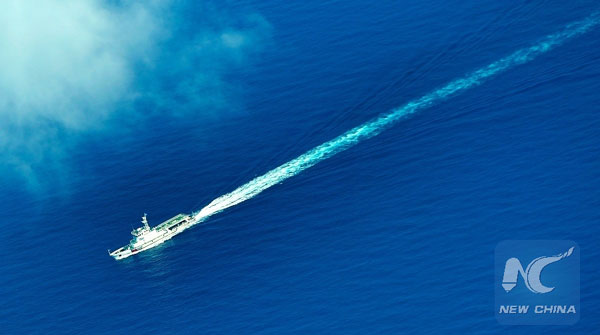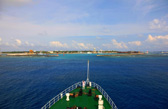Tribunal to issue South China Sea verdict on July 12
(Xinhua) Updated: 2016-06-29 22:53
 |
|
An aerial photo taken on Sept 25, 2015 from a seaplane of Hainan Maritime Safety Administration shows cruise vessel Haixun 1103 heading to the Yacheng 13-1 drilling rig during a patrol in South China Sea. [Photo/Xinhua] |
An arbitral tribunal with widely contested jurisdiction will issue an award on July 12 on the South China Sea case unilaterally initiated by the Philippines, the Permanent Court of Arbitration (PCA) in The Hague said on Wednesday.
"The Tribunal will issue its Award on Tuesday, 12 July 2016 at approximately 11 A.M.," the PCA, acting as the registry of the tribunal, said in a press release.
"The Award will first be issued via e-mail to the Parties, along with an accompanying Press Release containing a summary of the Award," it said.
China has refused to participate in the proceedings and declared that it will never recognize the verdict, stressing that the tribunal has no jurisdiction because the case is in essence related to territorial sovereignty and maritime delimitation.
Beijing has pointed out that territorial issues are not subject to the UN Convention on the Law of the Sea (UNCLOS), and that as early as in 2006 it declared -- in line with UNCLOS -- to exclude disputes concerning maritime delimitation from mandatory dispute-settlement procedures. Some 30 countries have also filed declarations of this kind.
After the PCA set date for the issuance of the final award, Chinese Foreign Ministry spokesman Hong Lei said the arbitral tribunal has no jurisdiction over the case and the relevant subject-matter, and that it should not have heard the case or rendered the award.
"The Philippines' unilateral initiation of arbitration breaches international law," he said late Wednesday.
"With regard to territorial issues and maritime delimitation disputes, China does not accept any means of third party dispute settlement or any solution imposed on China," he stressed.
The government of outgoing Philippine President Benigno Aquino III filed the arbitration against China in 2013, despite the agreement his country had reached with China on resolving their South China Sea disputes through bilateral negotiations.
Although Manila asserted that its submissions do not concern territorial sovereignty or maritime delimitation, the Philippine Foreign Ministry, a day after launching the arbitration, described the purpose of the case as to "protect our country's territory and oceanic area" and vowed not to "give up our country's sovereignty."
The tribunal failed to see that the Philippines' self-defeating claims were in fact over sovereignty, Michael Sheng-ti Gau, a professor of international law from China's Taiwan, said Sunday at a seminar in The Hague.
"The court should deal with the real issues of admissibility and jurisdiction existing in all the claims of the Philippines," he added.
Also speaking at the event, Abraham Sofaer, a former legal adviser to the US State Department, said the tribunal's ruling "will broadly undermine the potential utility of international adjudication."
"The real-world consequences of the Philippine case have already been seriously adverse to the interests of all parties, and are likely to get even worse," said the international law expert, who also served as a US federal judge.
Meanwhile, Beijing, whose stance on the arbitration case has drawn support from dozens of countries and international organizations, insists that the South China Sea issue should be resolved through negotiations and consultations between the directly involved parties.
Noting that whatever the verdict might be, it would not help ease tensions in the disputed waters, Pemmaraju Sreenivasa Rao, a former chairman of the UN International Law Commission, said at the seminar that peaceful negotiation is the best solution.
"Negotiation is the only best method for this kind of disputes, particularly with so many difficult features coming from a long background and history," added Rao, a participant in the Third UN Conference on the Law of the Sea from 1973 to 1982, which led to the adoption of UNCLOS.
Many in the Philippines share this view. Earlier this month, Rosario Manalo, a former Philippine foreign affairs under-secretary for international economic relations, said the best thing for both the Philippines and China is to "sit down and talk."







